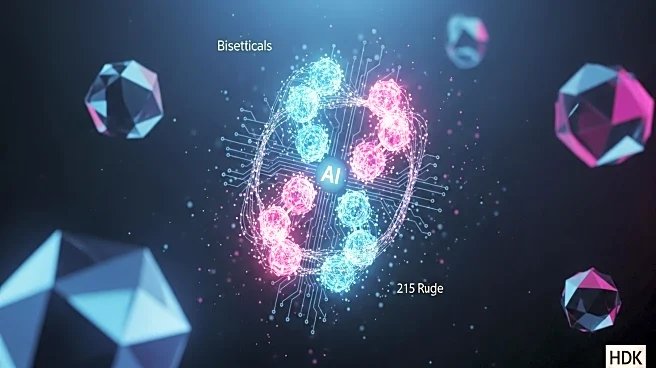What's Happening?
Recent advancements in antibody technologies are significantly impacting cancer treatment strategies. These developments include the use of bispecific antibodies and antibody-drug conjugates (ADCs), which enhance the precision and effectiveness of cancer therapies. Companies like Regeneron and Genmab are at the forefront, with Regeneron's PD-1 inhibitor Libtayo showing promising results in reducing disease recurrence in high-risk cutaneous squamous cell carcinoma. Genmab's Duobody platform is pioneering bispecific antibodies that simultaneously recruit immune cells and recognize tumor cells. Additionally, AI is being leveraged to improve antibody specificity, as demonstrated by the work of Nobel Laureate David Baker and the VISTA platform by Jura Bio, which designs antibodies targeting elusive cancer antigens.
Why It's Important?
These technological advancements in antibody design are crucial for improving cancer treatment outcomes. By increasing the specificity and reducing the toxicity of cancer therapies, these innovations offer a wider therapeutic window and potentially fewer side effects for patients. The integration of AI in antibody development could lead to more efficient and cost-effective drug discovery processes, addressing the high financial risks associated with bringing new cancer drugs to market. This progress is particularly significant for solid malignancies, where identifying cancer-specific targets remains a challenge. The success of these technologies could lead to more personalized and effective cancer treatments, benefiting patients and healthcare systems alike.
What's Next?
The field of antibody technology is poised for further advancements, with ongoing research and clinical trials expected to refine these therapies. Companies are likely to continue exploring AI-driven approaches to enhance antibody specificity and efficacy. As these technologies mature, regulatory approvals and market adoption will be critical steps. Stakeholders, including pharmaceutical companies, healthcare providers, and patients, will be closely monitoring these developments. The potential for these innovations to transform cancer treatment could lead to increased investment and collaboration across the biotech industry.
Beyond the Headlines
The ethical implications of using AI in drug development, particularly in terms of data privacy and algorithmic transparency, will need to be addressed. Additionally, the long-term impact of these technologies on healthcare costs and accessibility remains to be seen. As antibody therapies become more targeted, there may be shifts in treatment paradigms, emphasizing precision medicine. The success of these technologies could also influence research in other therapeutic areas, potentially leading to breakthroughs in treating a variety of diseases.










